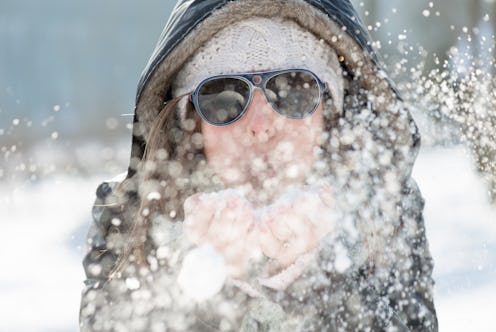Life
8 Ways to Treat Seasonal Affective Disorder

It may feel like you haven't seen the sun in forever, but the truth of the matter is that winter lasts far past the holidays — sometimes very far. Seasonal Affective Disorder (aptly given the acronym "SAD") sounds kind of like a joke, but it's a real condition, and you definitely don't want it to consume months of your life, every year, forever. With symptoms including irritability, low energy, grumpiness, hypersensitivity, fatigue, oversleeping, appetite changes, and weight gain, fall and winter Seasonal Affective Disorder can definitely be more than a minor inconvenience, and it's not "all in your head." If you suffer from it, you should not be embarrassed or ashamed. Instead, take heart — there are things you can do about it.
Some of the usual SAD tips we've heard feel obvious, or are a little overdone ("get more light!"), and others (like "sleep more!") may not actually be supported by our best current evidence. If you've tried some of that stuff and still feel crummy this winter, I'm here to help. These eight different ways to cure your Seasonal Affective Disorder are the right places to turn for further hope of relief. (As usual, though, if you think you might be suffering from "major" clinical depression or have thoughts of hurting yourself or others, a trip to see a mental health professional should be your very next move).
1. Take vitamin D
Vitamin D is linked with Seasonal Affective Disorder, and people probably aren't getting enough vitamin D in general anyway, so this is one supplement definitely worth taking. Your body can store some vitamin D, but after a while supply dwindles. Vitamin D supplements are cheap, just don't take them at night because there are reports of vitamin D boosting energy levels.
2. Take omega-3s
Omega-3 fatty acids won't fix all of your health problems, but you could be forgiven for getting this impression. Amongst other effects, studies also show that omega-3s protect against SAD. You should start taking them, if you're not already. It's a good idea to eat some fish, too.
3. Get less sleep
While it's true that going to bed earlier might make you happier, sleeping too much can make you feel just as bad as sleeping too little. Although it's been repeated endlessly into de facto common sense, many people don't literally need "eight hours" per night — and mild sleep deprivation actually seems to help depression. I know, I know. It's comfy in that bed, but don't let extra sleep bring you down.
4. Sleep in a colder room
While we're on the subject of coziness... that giant mound of bedding you love so dearly could also be a culprit in your SAD. For optimal sleep, the room needs to be fairly cool, at about 65 degrees Fahrenheit. If you live in a drafty old house, this may sound toasty warm. But if you're a space heater addict like me, it's time to lay off. Waking up 12 hours after you went to bed in a pool of sweat isn't going to do your winter mood any favors.
5. Get organized
It's tempting to strip off your winter gear the second you get in the door and leave it hanging around — gloves here, hat there, scarves everywhere, maybe some dirty puddles too. But evidence suggests that cluttered spaces stress people out — especially women. Treat yourself to some winter gear organizational tools like a proper coat rack, versatile sticky hooks, and a Boot Butler for hanging your footwear, and watch your mood improve.
6. Drink less coffee
It's very tempting to spend all those cold winter days sipping something warm and caffeinated, but this is imprudent if you're suffering from SAD. Though you can't get literally addicted to caffeine, it's pretty likely caffeine will disrupt your sleep. Try limiting caffeine to morning hours only for a week or two, and see what happens.
7. Drink less alcohol
Those mulled ciders and seasonal craft beers are additionally tempting at this time of year, but alcohol is also a prime sleep disrupter. If you already experience lower energy levels in winter, don't sap them further with low-quality, post-drinking sleep.
8. Hang out with other humans
Winter weather can cause you to stay in instead of going out, but engaging in social activities seems to protect against depression. So make sure you're still making time for your friends and family — just don't do it over coffee or alcohol.
Image: laszlolorik/Fotolia; Giphy (12)